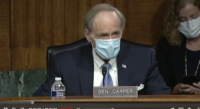The White House Council on Environmental Quality has finalized a regulation that restores basic project environmental review practices that were in place prior to changes made during the Trump administration. The rule is the first of two that will have the Biden administration’s stamp on how such reviews are done under the National Environmental Policy Act (NEPA) for major federal construction projects.
The 70-year old NEPA law requires agencies to evaluate all relevant potential environmental impacts before issuing a permit for project construction. Historically, that has meant not only the consideration of direct impacts, but also indirect and cumulative impacts. In 2021, the Trump administration finalized a rule that narrowed the range of impacts that required evaluation to only those that “directly” affected a project.
The new rule, finalized on April 19, restores the indirect and cumulative impact review—which include the effects of a project on greenhouse gas emissions and climate change—as part of the NEPA review process. The “Phase 1” rule also allows agencies to work with communities to mitigate or avoid environmental harms by analyzing alternative approaches to projects.
“Restoring these basic community safeguards will provide regulatory certainty, reduce conflict and help ensure that projects get built right the first time,” said Council Chair Brenda Mallory in a statement.
Environmental groups called the Phase 1 rule a necessary reversal of “damage” caused by the Trump administration revision.
“Good NEPA process requires robust community engagement, rigorous analysis and public disclosure, which leads to government accountability, better projects with more community buy-in, and less litigation," said Abigail Dillen, president of Earthjustice, in a statement.
But industry and business groups, which have long called for NEPA reforms, said the changes would result in lengthy project delays and added costs. Marty Durbin, senior vice president of policy at the U.S. Chamber of Commerce, said in a statement, “It should never take longer to get federal approval for an infrastructure project than it takes to build the project, but that very well may be the result of the administration’s changes that revert back to the broken 1978 NEPA review process.”
However, Chuck Nicholson, a senior environmental planner and scientist at HDR, said in an interview that he does not expect the Phase 1 revisions to change as much as critics suggest.
He said the Trump rule did not prohibit agencies from considering cumulative effects, and many firms continued to follow the processes established originally under NEPA. The new Phase 1 rule “is in part a reversion back to practices we were very used to and comfortable with, as were a lot of our clients both in and out of the government. So I don’t see this fairly narrowly focused new rule … resulting in longer time delays or increased costs in completing the legal review requirements.”
The Council now is working on Phase 2 NEPA requirement, which could be more ambitious in making changes than Phase 1, according to several sources.
“I would not be surprised if it more directly addresses climate change as an issue than it does in the current rule,” Nicholson said.





Post a comment to this article
Report Abusive Comment